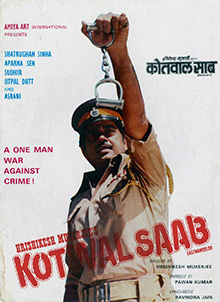Plot
Bharat Prasad Sinha (Shatrughan Sinha) is the new Deputy Superintendent of Police (DSP) in town. He has been assigned the task by Police Commissioner Ramesh Kulkarni (Om Shivpuri). The Commissioner informs him that Dharam Kohli (Utpal Dutt), who is standing as an MLA in the upcoming elections, is also involved with smuggling activities. On taking charge Bharat has to suspend Inspector Thakur (Manmohan) for corruption charges and being in league with Kohli. Bharat now takes charge as Inspector, keeping his real identity a secret, he is then informed by sources about Mahesh (Sudhir), one of the Kohli's (also referred to as Don) henchman. He goes to arrest Mahesh at his house where Mahesh stays with his mother and sister. There Bharat has a confrontation with Prabha (Aparna Sen), who is a family friend. Aparna stays as a lodger with a kind-hearted old gentleman, John Fernandes (David). Mahesh goes to Prabha's room at night and tries to get her to take a letter to his mother which will be collected by Kohli's men. Prabha refuses saying she won't be party to any of Mahesh's wrongdoings. The conversation is overheard by Bharat and his team, who arrest Mahesh as soon as he leaves the premises.
Bharat has Kohli arrested but has to let him go when Kohli suffers a minor heart attack and is rushed to hospital. Bharat decides to work undercover, and working covertly in tandem with the Police Commissioner, he officially resigns from the police force. The town people side with the Don-politician and refuse to help Bharat now that he's no longer a police officer. Looking for accommodation, he reaches Fernandes' house where Prabha stays as a lodger. The honest Fernandes and Prabha are soon won over to Bharat's side and he starts staying there as a lodger.
Prabha is sent a false telegram by the Kohli's men stating her mother is ill; they then inform Bharat that Prabha is in danger. Bharat goes after her and they reach Prabha's mother's house. There Bharat discloses his feelings and asks Prabha to marry him. After marriage, Bharat takes her to his own house where Prabha meets Bharat's sister Saraswati (Ritu Kanwal), who Bharat wants to have nothing to do with. On questioning, Bharat tells Prabha that his sister had an affair with a man and became pregnant before marriage. Aparna pleads that she is now married to the same man and Bharat should forgive her. He refuses to reconcile with his sister, calling her characterless.
On their return to town, Bharat learns that Mahesh has escaped. Bharat lets his co-officer, Inspector Ved (Raza Murad) know that he is still in the force. With Mahesh's help Awasthi (Asrani), working for Kohli, gets hold of incriminating photos of Prabha and Mahesh from their past relationship. He blackmails Prabha to get him a file Bharat has been working on that will help arrest Kohli. When Prabha refuses, Mahesh barges into the police station and informs Bharat about Prabha and his earlier relationship. Bharat is horrified to learn of his wife's affair and when Prabha refuses to answer his questions, he breaks up with her. Meanwhile, Kohli and Awasthi are arrested and brought to the police station. Kohli manages to get hold of Inspector Zaidi"s gun and in the scramble, Bharat is shot. While waiting for the ambulance he asks to see his wife. When Prabha arrives he asks her forgiveness and also tells her to ask Saraswati to forgive him. Bharat survives the operation and is united with Prabha.
This page is based on this
Wikipedia article Text is available under the
CC BY-SA 4.0 license; additional terms may apply.
Images, videos and audio are available under their respective licenses.
